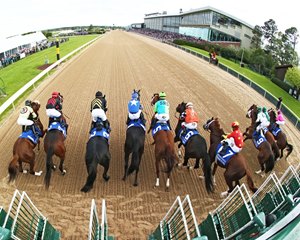Gambling Issues Could Impact Racing in Arkansas, Idaho


While a proposed constitutional amendment in Florida appears to be the biggest issue throughout the country on the upcoming November ballot that could impact racing, voters in Arkansas and Idaho will also consider gambling issues that could impact the sport.
Arkansas voters will consider an amendment to the state Constitution that would allow four casinos to operate in the state, including one at Oaklawn Park. Oaklawn, the lone Thoroughbred track in Arkansas, currently offers added gaming in the forms of historical racing and games of skill. If the amendment is approved, the track could switch to a full casino. The amendment requires the Oaklawn casino to be on track property.
Along with the ability to upgrade Oaklawn's gaming offerings, the track would also face some added in-state competition for the gambling dollar.
Oaklawn spokeswoman Jennifer Hoyt said the track has not taken a position either way on the issue.
The full-blown casinos created by this amendment would be able to offer slot machines and table games as well as sports wagering and would be regulated by the Arkansas Racing Commission. The casinos would be allowed at Oaklawn, Southland Racing (greyhounds), and stand-alone casinos near Pine Bluff and Russellville.
According to the amendment's language, 17.5% of receipts from the four casinos would be collected by the Arkansas Racing Commission to support purses at Oaklawn and Southland. If approved, the amendment also would allow historical racing games at a number of simulcast pari-mutuel facilities.
With historical racing and games of skill to help boost purses, Oaklawn racing has thrived. Purses have gone from about $11 million in 2001 to $28.4 million in 2017.
Meanwhile in Idaho, the racing industry supports Proposition 1, which would allow historical racing at tracks.
After Les Bois Park went under in 2009, it was able to re-open in 2011 thanks to help from historical racing machines to fund purses. More than $1.1 million was awarded in purses in both 2014 and 2015, with 181 races offered in 2014 and 168 in 2015. But after initially approving the machines, Idaho lawmakers repealed that decision.
With historical racing gone, Idaho racing offered just 23 races in 2016 and 16 in 2017.
Voters in November will decide if they want to amend state law to allow the machines at locations that conduct pari-mutuel wagering on live or simulcast races. If approved, the added gaming would fund increased live racing.
The Idaho Statesman has endorsed the initiative, noting it would save horse racing in the state. The paper said that state lawmakers took the games away in 2015 after the Coeur d'Alene Tribe and National Indian Gaming Association lobbied against them. The paper contends that change has cost public education about $1 million annually and hundreds of racing and breeding industry jobs.
